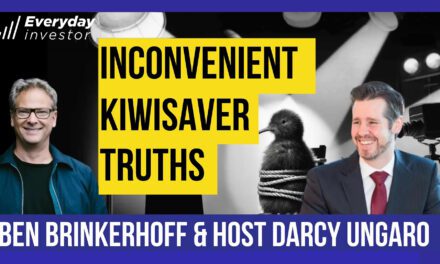Nudging Towards Wealth
What confusing telcos, colourful investor prospectuses, and buffet dinners have in common
———
Did you know that even the most experienced investors are more likely to give money to a more colourful investor prospectus? Or that the trick to making people eat healthier might be as simple as moving the salad bowl? Behavioural economist Ravi Dutta-Powell from the Behavioural Insights Team joins the Everyday Investor podcast to discuss behavioural economics, nudge theory, and the massive impacts these things have on our investing habits.
———
While there’s no shortage of inspirational hallmark cards to remind us how unique we all are, at the end of the day, we’re all — investors included — victims to the same common tropes of human behavior.
You wouldn’t believe it if you were still reading old economics text books though; neoclassical economics made some very generous stereotypes of all people as being rational, widely read, balanced engagers of commerce — if life were that simple I probably would’ve never bought the Tesla!
“What behavioural economics does, is it uses experiments to show that these rigid assumptions simply don’t hold up,” said Ravi Dutta-Powell, Financial Markets advisor at the Behavioural Insights Team.
In reality, people aren’t nearly as clever as they think, and are a whole lot lazier. Behavioural economics combines psychology and economics in an attempt to quantify the many patterns we’re all guilty of falling into; things default bias, the probability that we’re going to keep doing the same crap until something gives us a kick up the bum to change it; or present bias, the devil on our shoulder who tells us to ignore our future self and throw our retirement savings into gold when we see the price going up.
Giving us this framework to understand all the different ways we suck is all well and good, but what can we do to change? Enter ‘Nudge Theory’.
Nudging is the next step in the evolution of economic theory, which marries our understanding of how people work, with distinct ways that can influence decision making. Ravi brings up the example from god-tier economist, Richard Thaler of the buffet — we’ve paid the cost of entry for the kai, and we can all agree that it’s probably in our best interest to eat healthier, so why don’t we just design the buffet to give people the salads first and french fries last? This is a little trick called choice architecture, which helps manipulate individuals to make better choices, without taking away their right to choose (or free market).
Another great example of this Nudge Theory in action comes in the form of Save More Tomorrow, the now wildly successful saving scheme where employer and employee agree to set aside a portion of all future pay rises towards some form of savings. It’s a perfect example of Nudge Theory in action, which has helped more than 15 million people in the states save a hell of a lot more money.
As part of our conversation, we also look into the Behavioural Insights Team’s research into New Zealand’s overwhelming telco ‘confusopoly’ where savvy companies coax Kiwis into bad decisions with overwhelming choices, where the fix could just be a wee little nudge. We hope you enjoy the podcast today and take some learnings about where you yourself fall into some of these behaviours — recognizing your own biases as an investor is the first and most important step to fixing them.
Reading materials from today’s podcast:
- https://www.behavioraleconomics.com/be-guide/
- https://www.bi.team/our-work/blog/
- Thinking fast and slow, Daniel Kahneman
- Misbehaving: The Making of Behavioral Economics, Richard Thaler
- Nudge, Richard Thaler
_______________________________________________________________________
The NZ Everyday Investor is brought to you in partnership with Hatch. Hatch, let’s you become a shareholder in the world’s biggest companies and funds. We’re talking about Apple and Zoom, Vanguard and Blackrock.
So, if you’re listening in right now and have thought about investing in the US share markets, well, Hatch has given us a special offer just for you… they’ll give you a $20 NZD top-up when you make an initial deposit into your Hatch account of $100NZD or more.
Just go to https://hatch.as/NZEverydayInvestor to grab your top up.
________________________________________________________________________
Like what you’ve heard?
You can really help with the success of the NZ Everyday Investor by doing the following:
1- Tell your friends!
2- Write a review on Facebook, or your favourite podcast player
3- Help support the mission of our show on Patreon by contributing here
4- To catch the live episodes, please ensure you have subscribed to us on Youtube:
5- Sign up to our newsletter here
NZ Everyday Investor is on a mission to increase financial literacy and make investing more accessible for the everyday person!
Please ensure that you act independently from any of the content provided in these episodes – it should not be considered personalised financial advice for you. This means, you should either do your own research taking on board a broad range of opinions, or ideally, consult and engage an authorised financial adviser to provide guidance around your specific goals and objectives.
_____________________________________________________________________________






